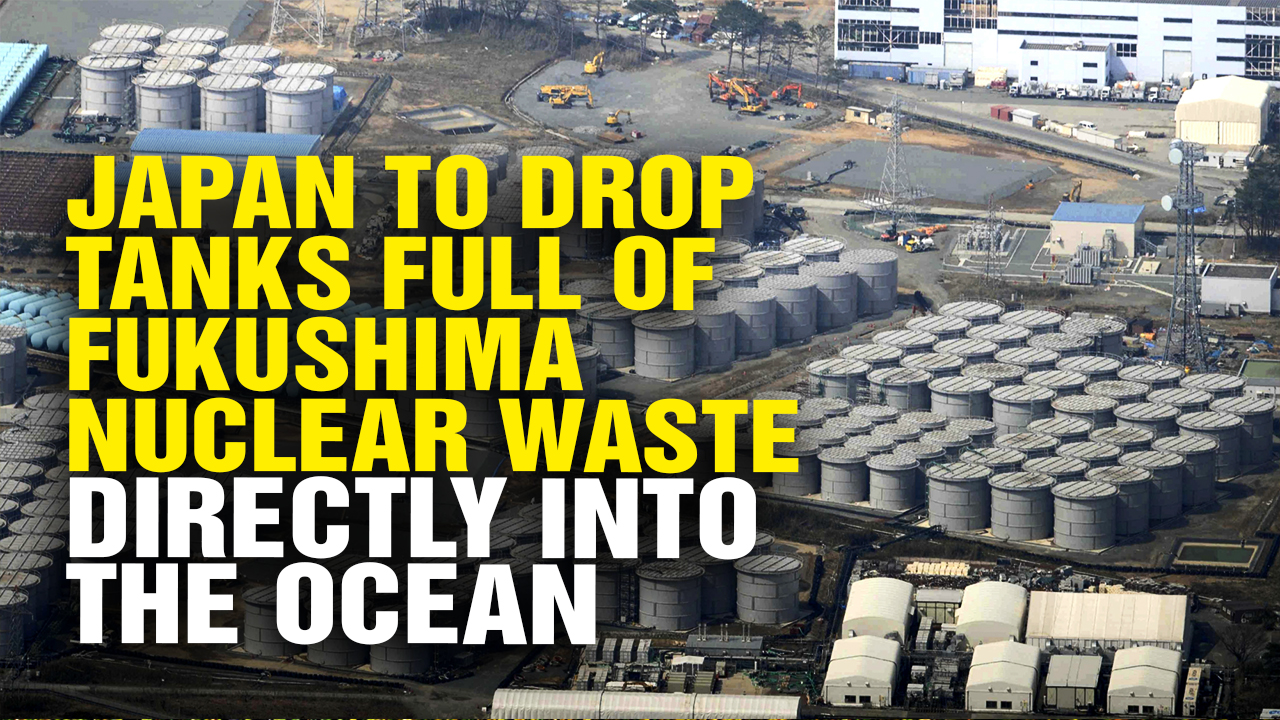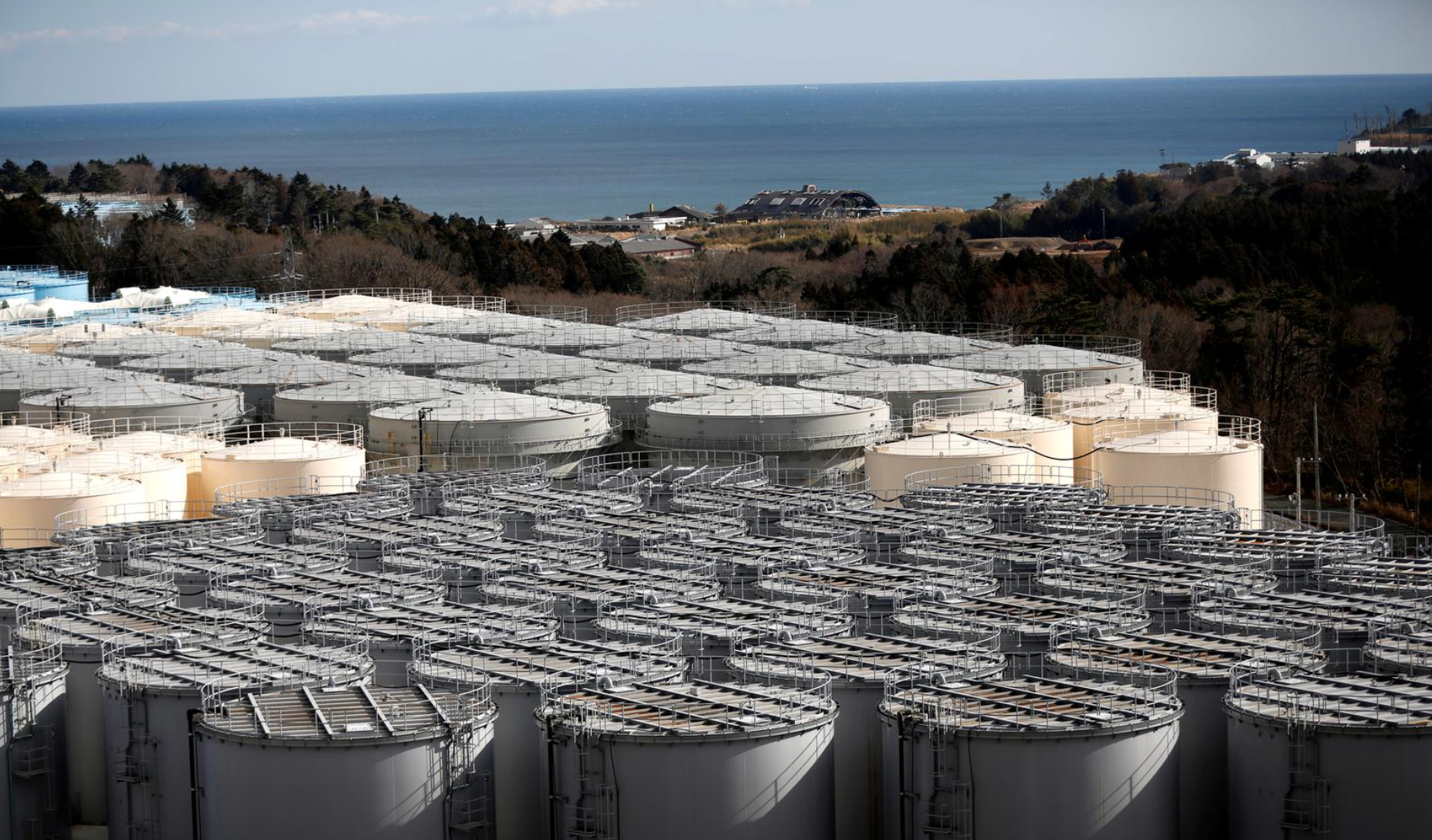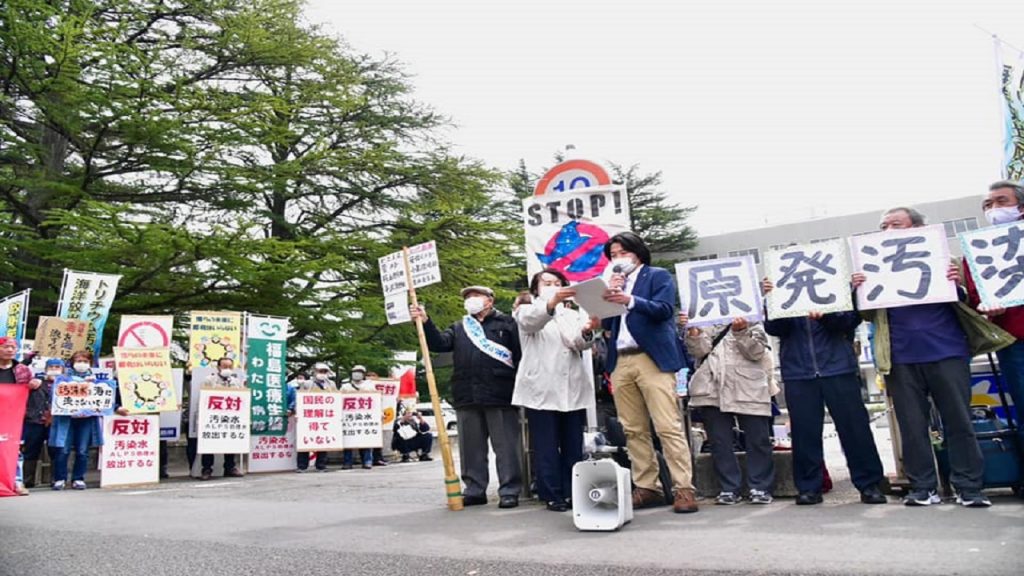
Condemning Third Ocean Dumping of
Fukushima’s Contaminated Water
Korean Peoples’ Action Against Japan’s Ocean Dumping of Radioactive Wastewater
(November 2, 2023) — As the Japanese government began the third round of offshore dumping of contaminated water today, KPA-AJODRW held a press conference to condemn the third round of dumping in front of the statue of Yi Sun-sin in Gwanghwamun Square, Seoul.
Lee Seung-hoon, who moderated the event, said that although the polluted water has begun to be discharged, “we must continue to carry out activities to stop the discharge, and we will continue to appeal to citizens to join us.”
In his opening remarks, Kim Young-hwan, a researcher at the Citizens’ Center for Environmental Health, pointed out that Korea joined the London Convention due to criticism from various countries and civil society, including Japan, when it dumped factory wastewater into the sea. “If Japan is dumping polluted water into the sea and we can’t say that, why do we have a Ministry of Oceans and Fisheries,” he said. “Ten years ago, I was ashamed of Korea for dumping garbage into the sea, but now I am ashamed of Korea for being silent.”
“The Fukushima nuclear accident is a representative case of the nuclear industry’s lies, cover-ups, and proliferation,” said Lee Jung-yoon, head of Nuclear Safety and Future, emphasizing that nuclear contaminated water continues to flow into the sea. “We condemn the incompetence of the Yoon Seok-yeol government, which has not said a word about the three discharges of contaminated water.”
Dr. Baek Do-myung, professor emeritus at Seoul National University’s Graduate School of Public Health, pointed out that the IAEA has “never agreed on an international standard” for Japan’s plan to dump contaminated water. The reason is that “countries with international standards are a minority of countries with nuclear power plants, and the rest of the countries or countries that dump indiscriminately have no standards.”
He also pointed out the contradiction that “the standards of countries with standards are also different from country to country, but it is said that it is only necessary to dilute and discharge according to the standard. He emphasized that “there is no threshold for carcinogens,” and that even if the concentration of contaminated water decreases as it leaves the ocean, “the number of people exposed is very large and should not be ignored.”
Choi Soo-na, Director of the Civic Movement Bureau of the Korea YWCA Federation, criticized the Korean government’s plan to spend 3.14 trillion won ($3.36 billion) by 2028 backing up the Japanese government’s absurd plan, saying, “The Korean government is planning to cut all youth-related subsidies and cut all local government subsidies, totaling 18.1 trillion won, next year.” “Use the taxpayers’ money for the crumbling welfare and the socially vulnerable,” she said.
“The Yoon administration should know that Korean people are not ‘Marutas’ to be consumed for the economic benefit of the Japanese government,” said Kwon Jong-tak, executive committee member of the National Food Coalition.
“Recognizing that the Japanese government has engaged in ocean dumping for economic gain, and that export restrictions will cause even greater economic losses, the Yoon administration should immediately stop importing all seafood from Japan to stop ocean dumping,”and “strengthen quarantine for seafood that may be contaminated with nuclear radiation that has already been dumped at sea.”
He asked the National Assembly to “adopt a resolution calling for a ban on all imports of Japanese seafood,” to “actively work on a local ordinance to strengthen radiation quarantine standards in public and corporate cafeterias, including schools and the military, where there is no choice,” and to “actively work on a local ordinance to immediately suspend the handling of imported Japanese seafood suspected of being radioactive.”
Finally, the press conference was concluded with the reading of the statement by Park Seok-woon, Permanent Representative of the Korea Progressive Alliance, and Han Jung-hee, a citizen of Gwacheon, and the chanting of slogans by the participants.

Statement to Condemn the Third Offshore Dumping
of Fukushima Nuclear Contaminated Water
(November 2, 2023) — The Japanese government must immediately stop dumping Fukushima nuclear contaminated water into the ocean!
The third discharge of nuclear contaminated water from Fukushima has just begun. It is said that 7,800 tons of contaminated water will be dumped into the sea for about 17 days from today.
In the samples of the contaminated water discharged this time, higher concentrations of radioactive substances were detected than in the second discharge, raising many people’s concerns. Among the radioactive substances detected in the contaminated water samples, strontium-90 and yttrium-90 are detected at this time, which were not detected at the time of the second discharge.* Strontium-90, in particular, is a substance that can cause cancer when accumulated in the body. The position of the Japanese government and TEPCO that the ALPS can remove most harmful substances except for tritium has been consistently shown to be false.
Two months after Fukushima began discharging nuclear contaminated water, the ocean has seen a dramatic change. On October 21, a tritium concentration of 22㏃/L was detected near the contaminated water outfall, the highest level of tritium detected since the dumping of contaminated water began in August, revealing a crisis for the ocean and humanity.** The Japanese government’s claim that the tritium would spread widely along the ocean currents and not increase the concentration of tritium at specific points was also proven false early on.
Even the ALPS, which is supposed to treat nuclear contaminated water, is struggling. Problems with the Japanese government’s contaminated water treatment process continue to emerge, including equipment failures in the contaminated water tanks, where a substance believed to be “rust” adheres to the filters of the contaminated water pumps and clogs them, and samples of contaminated water from the third discharge have been found to contain higher levels of radioactive material than the second discharge. In addition, it was reported on the 25th that workers who were cleaning pipes at the contaminated water purification facility ALPS were exposed to contaminated water that spewed out.
Despite all of these problems, the Japanese government and TEPCO have not stopped dumping Fukushima’s nuclear contaminated water. What’s most concerning is that the release into the ocean could last much longer than the 30 to 40 years the Japanese government claims. With not a single gram of melted nuclear fuel removed from the plant’s interior, there’s no telling how long the contaminated water will be there or what problems it will cause.

The dumping of Fukushima contaminated water at sea has a huge social cost for countries that share the ocean. The South Korean government, which imports Japanese seafood, has reportedly increased its budget for quarantining Fukushima contaminated water fivefold next year, from 3.3 billion to 16.6 billion won. It is an absurd situation that the South Korean government, which is supposed to run a sound fiscal policy, is expanding its budget by assuming the cost of nuclear contaminated water treatment by the Japanese government, even though it is supposed to periodically test and manage harmful substances such as radioactivity for seafood.
If the Yoon administration truly cares about the safety of its citizens, it should unequivocally oppose the dumping of Fukushima contaminated water into the ocean. We must also hold the Japanese government accountable at the International Tribunal for the Law of the Sea for dumping nuclear contaminated water, and prohibit all imports of Japanese seafood. The Japanese government should immediately stop the dangerous ocean dumping and work transparently with the international community to ensure the safe decommissioning of the Fukushima Daiichi nuclear power plant.
* Note1: Source: Kyunghyang Shimun_20/Oct/2023_ https://m.khan.co.kr/world/world-general/article/202310201125001#c2b (Korean)
** Note2: Source: Kyunghyang Shinmun_16/Oct/2023_https://m.khan.co.kr/world/world-general/article/202310161144001#c2b (Korean)
Attached: Original Korean Version
https://docs.google.com/document/d/1IjwuPpLO8a84mRa7buY_xEdrA4UjxJMC3WxBmse5anU/edit

Updates for Further Action to Stop
Ocean Dumping of Fukushima Wastewater
Denise K. H. Yoon / Korea Center for Sustainable Development
(November 2, 2023) — I hope you have good days in your place and pray for the people who are suffering from the war in Ukraine and Gaza.
I would like to share the updates with you after today’s meeting on our further action in the future.
Today, activists from 6 countries, Australia, Indonesia, Japan, Korea, the Pacific Islands, and the USA (NY, California), joined. I’m sorry that our European colleagues could not join due to the time zone. I kindly ask your understanding that the online meeting time was prioritized inviting actors around the Pacific at the moment.
- Recent Situations and Activities
Please find the updated news in each country in the meeting note here. For those who could not join today’s meeting, please share your activities and ideas by email reply or writing down in the meeting note.
As you know, this issue has been framed as a global political hegemonic conflict between the USA and China by Japan and the USA, not a universal environmental and health issue.
Allies with the USA in the world have strongly supported Japan, or at least been silent. The USA and its allies are now taking action to import Fukushima seafood against China’s ban of Japanese seafood.
FYI, News Article — US military starts bulk buying Japanese seafood to counter China’s ban following Fukushima waste water release —SCMP, Oct 31, 2023_https://www.scmp.com/news/asia/east-asia/article/3239775/us-military-starts-bulk-buying-japanese-seafood-counter-chinas-ban
In general, many CSOs turned to the long-term action strategy and are expected to focus on advocacy activities to governments and international organizations. Less street protests and rallies will be organized.
Responding to the general election in Korea and presidential election in Taiwan in the early of next year, CSOs in both countries will promote anti-candidate campaigns.
In addition, Korean civil society groups promote the establishment of legal regulations to strengthen quarantines of Japanese Seafood including supporting the Civil Monitoring with local governments together with consumer campaigns No Japanese Seafood this year.
The Pacific Island group will intervene in the major intergovernmental meetings like ASEAN, PIF and so on this year.
- Annual Meeting Around the World Ocean Day
We agreed to hold a regular network meeting to follow-up this issue and discuss the further actions, at least once per year, around World Ocean Day, June 8th.
It can be a formal or informal online meeting.
I volunteered to take charge of a focal point to organize the 2024 network meeting, and participants of today’s meeting will support it as core members until June 2024.
- General Communication and Network
Informal or formal meetings can be organized at any time depending on the calls from the network members.
Please keep following up the emails and updating your activities with this google email group for our prompt cooperation worldwide.
- Join the Global Network
- Telegram for live communication-invitation link: https://t.me/+j0gbuc-SHdQ4Yzk1(Please click this link and join it. If you have no Telegram app in your device, you can join it after downloading the app)
- Register at Google Groups: https://forms.gle/csgWvhxFDWiVWPE87
- Archives(Campaign Website)(Since July 2023): https://nuclearfreeocean.org/g/en
- Global Campaign Network’s Meeting Notes: https://docs.google.com/document/d/14-3UXDJnH_4gsN9xGC5jNHFM1dqAusSCHAEugAFhpKI/edit?usp=sharing
Best regards,
Denise K. H. Yoon 윤경효, Board Member of the Korea Center for Sustainable Development (사)한국지속가능발전센터 이사